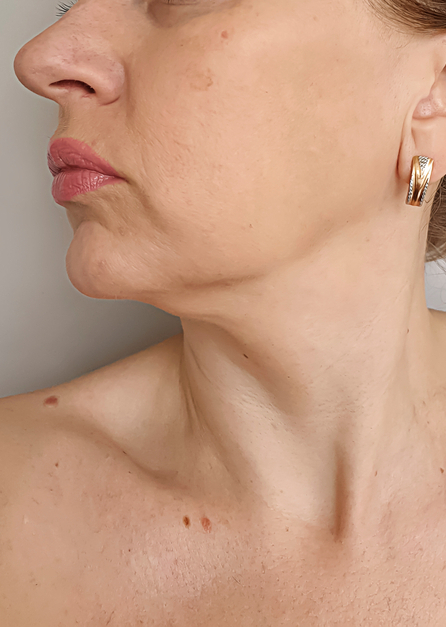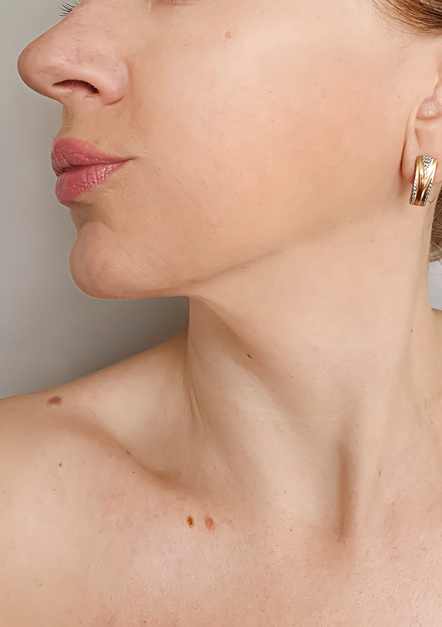Jump To:
Fast Facts
- Approximate Length of Stay: 1 Week
- Hospital Stay: 1 Night
- Operation Duration: 1-3 Hours
- Approximate Recovery: 2-4 Weeks

Facelift
A “Facelift”, medically known as a “Rhytidectomy”, is a cosmetic surgical procedure designed to reduce the visible signs of aging in the face and neck by tightening sagging skin, smoothing out wrinkles, and improving overall facial contour.
It primarily addresses the lower two-thirds of the face, including the cheeks, jawline, and neck.
Purpose of a Facelift
The procedure is intended to create a more youthful appearance by addressing:
- Sagging skin in the face and neck
- Deep creases around the nose and mouth (nasolabial folds)
- Jowls along the jawline
- Loose skin or “turkey neck” in the neck area
Procedure Overview
- Incisions:
- The surgeon typically makes incisions along the hairline at the temples, continuing around the ear and possibly extending into the lower scalp.
- For neck concerns, an additional small incision may be made under the chin.
- Tightening and Repositioning:
- The underlying tissues and muscles are tightened, and excess skin is removed.
- Fat may also be sculpted or redistributed to create a more youthful contour.
- Closure:
- Once the adjustments are made, the skin is redraped over the newly rejuvenated contours, and the incisions are closed with sutures or skin adhesives.
Types of Facelifts
Traditional Facelift
- Addresses moderate to severe aging in the face and neck. This technique provides the most comprehensive correction.
Mini Facelift
- Involves smaller incisions and is typically used for patients with less severe signs of aging, focusing on the lower face and jawline.
Neck Lift
- Often performed alongside a facelift to address sagging and wrinkles in the neck area.
Recovery
- Initial Recovery: Swelling, bruising, and discomfort are common for the first few weeks. Pain is usually mild and can be managed with medication.
- Compression Bandages: Patients may need to wear compression bandages to reduce swelling and support healing.
- Return to Normal Activities: Most patients return to work and light activities within 2 to 4 weeks, but it may take several months for the final results to fully settle.
Results
- A facelift can significantly rejuvenate the face by reducing sagging, lifting the skin, and creating a smoother, more youthful contour. Results are long-lasting, but the natural aging process continues, so the effects may gradually diminish over time.
Risks
- Risks include infection, bleeding, scarring, temporary or permanent changes in skin sensation, hairline changes, or asymmetry. Choosing an experienced surgeon can help minimize these risks.
Ideal Candidates
- Individuals with sagging facial skin, deep lines, or jowls, who are in good health and have realistic expectations about the outcome of the surgery.
A facelift is often sought by people who want to refresh their facial appearance, SHIFA helps provide a more youthful and rejuvenated look while still appearing natural.
Compare Before and After Images


Facelift
Frequently Asked
Questions
How painful is a full Facelift?
Pain levels can vary from person to person, but it is common to experience some discomfort following a full Facelift procedure. Typically, patients can expect to feel pain and soreness in the treated areas for about 2 to 4 days after the surgery. However, the pain can be managed with prescribed pain medications and other techniques recommended by your surgeon.
Is Plastic Surgery safe in Iran?
Yes, Plastic Surgery in Iran can be safe when performed by qualified and experienced plastic surgeons in accredited facilities. Iran has gained a reputation as a popular destination for medical tourism, including plastic surgery, due to its advanced medical infrastructure, well-trained surgeons, and strict regulations governing healthcare facilities.
Why choose SHIFA for Cosmetic Surgery?
In SHIFA we offer all cosmetic and therapeutic surgeries in the shortest possible time with the most reasonable cost.
From transportation services between hotels and medical centers to the use of expert surgeons in every field of treatment, SHIFA is by your side.
How long can you fly after Facelift Surgery?
In most cases, a patient flying after Facelift Surgery should wait at least a full week between their procedure and their departure before heading on board a plane, though this can change.
SHIFA's Departments
Related Services
Featured Services

Facial Fillers
“Facial Fillers”, also known as “Dermal Fillers”, are injectable substances used to restore volume, smooth out wrinkles, and enhance facial

Body Contouring
“Body Contouring” refers to a range of surgical and non-surgical procedures designed to reshape and improve the appearance of the

Ear Cosmetic Surgery
“Ear Cosmetic Surgery”, also known as “Otoplasty”, is a surgical procedure aimed at altering the shape, size, or position of

Upper Arm Lift
An “Upper Arm Lift”, also known as “Brachioplasty”, is a surgical procedure designed to improve the appearance of the upper
Our Blog Articles
- mehdi.mhj@gmail.com
What are the benefits of online doctor booking
Explore importance of quality sleep & learn tips to improve your sleep, ensuring raise-up refreshed...
Read More- mehdi.mhj@gmail.com
Doccure – Making your clinic painless visit?
Explore the benefits & challenges of virtual healthcare appointments, along with tips for making good...
Read More- mehdi.mhj@gmail.com
5 Great reasons to use an online doctor to choose
Delve into the impact of digital life on mental health & discover practical strategies to...
Read More- mehdi.mhj@gmail.com
Benefits of Consulting With an Online Doctor
Uncover strategies to achieve a harmonious balance between professional and personal well-being....
Read More





Comments are closed.